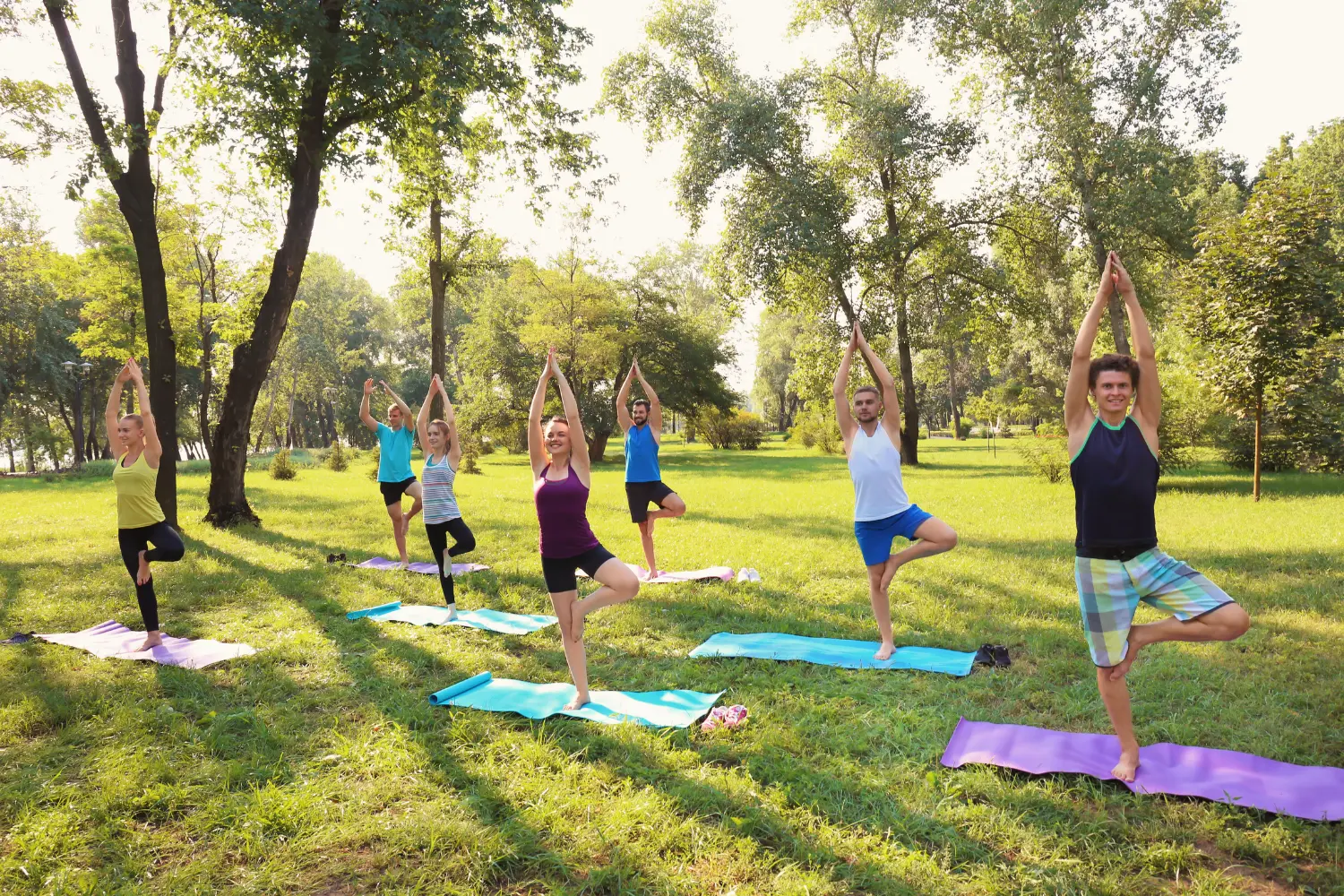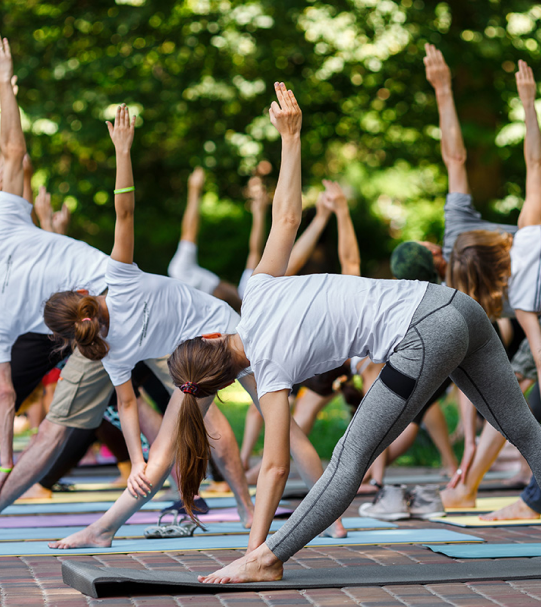
Recreational Therapy for Addiction at Wellbridge
Find Hope and Healing with Our Holistic Addiction Care

Traditional evidence-based therapies often serve as the cornerstone of substance use and addiction treatment. However, integrating recreational activities into addiction care can offer a unique avenue for healing and growth, giving those in early recovery new outlets to cultivate insights and solidify the gains being made through evidence-based approaches.[1]
At Wellbridge, we recognize the profound impact that recreational therapy can have on individuals grappling with addiction. Our program seamlessly weaves together traditional therapeutic modalities with engaging recreational pursuits, providing a comprehensive approach to recovery. We believe that embracing the full spectrum of human experience gives you a place to rediscover joy, meaning, and a renewed sense of self.
What is Recreational Therapy?
Recreational therapy is a specialized form of therapy that utilizes recreational activities and interventions to address your physical, emotional, cognitive, and social needs. The primary goal of recreational therapy is to improve functioning and well-being and to enhance overall quality of life.
At Wellbridge, our holistic view of care ensures that wellness is integrated into every treatment plan. From our perspective, a healthy mind relies on a sound body and engaged spirit. Treatment includes wellness programs that are specific to the needs of the patient. In our Wellness Center, we offer a variety of options that can include yoga, exercise and fitness programs, and access to our serenity pools and golf simulator.
Recreational Therapies can mitigate addiction risk factors and bolster the course of recovery. Our Recreational Therapy program complements traditional psychotherapy and family therapy. Our Certified Recreational Therapists are specially trained to empower patients to be heard, seen, and understood in new ways through leisure education, cooperative games/sports, leisure art making, and learning how to have sober fun.
Through participation in recreational activities, you can achieve a variety of therapeutic outcomes, including improved physical fitness, enhanced social skills, increased self-esteem, reduced stress and anxiety, enhanced mood, and improved overall mental health.[2] Recreational therapy is used across a diverse range of settings, including hospitals, rehabilitation centers, psychiatric facilities, long-term care facilities, community centers, and schools, to support people in achieving their sobriety goals.
What Can Recreational Therapy Help With?
Recreational therapy for addiction offers a multifaceted approach to recovery by addressing several key aspects of your journey toward sobriety. Physically, engaging in recreational activities can aid in the rehabilitation process by restoring strength, coordination, and overall physical well-being, which may have been compromised by substance abuse.[3]
Emotionally, recreational therapy provides avenues for you to express yourself, manage stress, and find joy beyond the grip of addiction. These activities offer outlets for emotional expression and self-discovery.[4]
Recreational therapy also fosters cognitive restructuring and skill-building, helping you develop healthy coping mechanisms and decision-making skills crucial for maintaining sobriety.[5]
Do you think Recreational Therapy could be right for you or a loved one? We’re ready to help you recover.What Are the Benefits of Recreational Therapy?
Participation in recreational therapy offers many potential benefits across physical, emotional, cognitive, and social dimensions:[6]
- Physical health: Engaging in recreational activities promotes physical well-being by improving cardiovascular health, enhancing strength, flexibility, and coordination, and supporting overall fitness levels. This is particularly beneficial for individuals in recovery from substance abuse, as it helps restore physical health that may have been compromised during addiction.
- Emotional well-being: Recreational therapy provides opportunities for emotional expression, stress reduction, and mood enhancement. Participating in enjoyable activities can boost mood, increase self-esteem, and provide a sense of accomplishment, which is especially crucial for those grappling with substance abuse or co-occurring issues.
- Cognitive functioning: Recreational therapy stimulates cognitive processes such as problem-solving, decision-making, and memory recall. Engaging in various activities challenges the brain and fosters cognitive flexibility, which can be instrumental in overcoming addiction-related thought patterns and developing healthier coping strategies.
- Social connection: Participating in recreational activities fosters social interaction, communication skills, and the development of supportive relationships. This is vital for those in the recovery process, as building a strong support network can provide encouragement, accountability, and a sense of belonging, reducing feelings of isolation and enhancing overall well-being.
- Stress reduction: Recreational activities serve as effective outlets for stress relief and relaxation. Engaging in enjoyable pursuits such as nature walks, art therapy, or mindfulness practices can reduce physiological and psychological stress, promoting a sense of calm and emotional equilibrium – crucial elements in addiction recovery.
How and Why Recreational Therapy Works
Recreational therapy activities for substance abuse have emerged as a powerful adjunct to traditional treatment modalities, offering holistic benefits that contribute to the overall well-being and recovery of those grappling with addiction. The effectiveness of recreational therapy can be attributed to its multifaceted approach:
- Physical benefits: Studies have shown that engagement in recreational activities can significantly improve physical health outcomes for individuals in recovery. Participation in recreational therapy programs has been associated with reduced rates of obesity and cardiovascular disease among individuals with substance use disorders.[7]
- Emotional well-being: Recreational therapy plays a crucial role in supporting emotional well-being and mental health for people in recovery. Research indicates that participation in recreational activities can reduce symptoms of depression and anxiety, enhance self-esteem, and promote a sense of purpose and accomplishment.[8]
- Cognitive functioning: Recreational therapy stimulates cognitive functioning and promotes cognitive flexibility, which are critical for overcoming addiction-related challenges. Research suggests that engagement in cognitively stimulating activities, such as puzzles, games, and creative arts, can enhance cognitive function and executive skills among individuals in recovery.[9]
What to Expect With Recreational Therapy for Addiction
At Wellbridge, we pride ourselves on offering a comprehensive and enriching experience for people seeking recovery from addiction. Our recreational therapy program goes above and beyond traditional approaches, seamlessly integrating a diverse range of activities and amenities to support holistic healing and well-being.
Our newly constructed 10,000-square-foot Wellness Center provides a warm and inviting environment for individuals to embark on their journey to recovery. It offers a range of engaging activities tailored to your interests and preferences. From our golf simulator to our inviting pool area, you’ll have access to a variety of options for physical fitness and leisure.
Our personalized approach ensures that each of our patients can find activities that resonate with their unique needs and goals. Whether participating in a group fitness class, receiving one-on-one personal training, or exploring our art therapy sessions, patients at Wellbridge receive personalized attention and support from our team of experienced professionals.
Frequently Asked Questions About Recreational Therapies for Addiction
How does recreational therapy promote physical health during addiction recovery?
Recreational therapy promotes physical health during addiction recovery by incorporating activities that improve cardiovascular fitness, strength, flexibility, and overall well-being. Engaging in recreational activities such as sports, fitness classes, outdoor adventures, and dance provides physical exercise and helps individuals develop healthier lifestyle habits. These activities can contribute to the restoration of physical health that may have been compromised during addiction, supporting individuals in their journey toward recovery.
Are recreational therapy programs tailored to individual needs and preferences?
Yes, recreational therapy programs are typically tailored to individual needs and preferences. Recreational therapists conduct assessments to understand each individual’s strengths, interests, limitations, and treatment goals. Based on this information, personalized treatment plans are developed to ensure that activities align with the individual’s preferences and are suitable for their unique circumstances.
By offering a variety of recreational options and adapting interventions as needed, recreational therapy programs strive to create meaningful and engaging experiences that support each individual’s recovery journey.
How does recreational therapy support relapse prevention efforts?
Recreational therapy supports relapse prevention efforts by providing individuals with healthy coping mechanisms, stress management skills, and alternative ways to find joy and fulfillment. Engaging in recreational activities helps individuals build resilience, develop social connections, and foster a sense of purpose beyond addiction. By participating in enjoyable and meaningful pursuits, individuals can reduce feelings of boredom, isolation, and cravings that may contribute to relapse. Additionally, recreational therapy programs often incorporate mindfulness techniques and relaxation exercises to promote emotional regulation and self-awareness, empowering individuals to navigate triggers and challenges in recovery more effectively.
Sources
[1] National Council for Therapeutic Recreation Certification. (2019). About Recreational Therapy | NCTRC. Nctrc.org. https://www.nctrc.org/about-ncrtc/about-recreational-therapy/ on May 16, 2024
[2] Harold, W., & Cook, H. D. (2019). Physical Activity and Physical Education: Relationship to Growth, Development, and Health. Nih.gov; National Academies Press (US). 5https://www.ncbi.nlm.nih.gov/books/NBK201497/ on May 16, 2024
[3] National Council for Therapeutic Recreation Certification. (2019). About Recreational Therapy | NCTRC. Nctrc.org. https://www.nctrc.org/about-ncrtc/about-recreational-therapy/ on May 16, 2024
[4] About Recreational Therapy | Clinical Center Home Page. (n.d.). Clinicalcenter.nih.gov. https://clinicalcenter.nih.gov/rmd/rt/index.html on May 16, 2024
[5] Litchke, L. G., Quinn, B., Turner, K., & Trapp, K. (2021). Therapeutic Recreation Activities Combined with a 12-Step Faith-Based Program for Adults Experiencing Addiction, Mental Health, and Homelessness: A Case Study. Alcoholism Treatment Quarterly, 40(2), 217–228. https://doi.org/10.1080/07347324.2021.1981181 on May 16, 2024
[6] Kim, E. J., Kang, H. W., & Park, S. M. (2020). A Meta-Analysis on the Effects of Therapeutic Recreation Programs for the Elderly. International Journal of Environmental Research and Public Health, 17(20), 7367. https://doi.org/10.3390/ijerph17207367 on May 16, 2024
[7] Weinstock, J., Farney, M. R., Elrod, N. M., Henderson, C. E., & Weiss, E. P. (2017). Exercise as an Adjunctive Treatment for Substance Use Disorders: Rationale and Intervention Description. Journal of Substance Abuse Treatment, 72, 40–47. https://doi.org/10.1016/j.jsat.2016.09.002 on May 16, 2024
[8] Chandler, M. Leisure Education: A Component of Outpatient Addiction Counseling. Journal of Addictions Nursing, 9(2), 84–86. https://doi.org/10.3109/10884609709041826 on May 16, 2024
[9] Bell, M. (2016). Therapeutic Recreation in Addiction Treatment. University Presentation Showcase Event. https://encompass.eku.edu/swps/2016/graduate/5/ on May 16, 2024
Do you or a loved one struggle with substance abuse?
We’re here to help. Our caring and professional team is standing by to help you get started today.